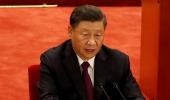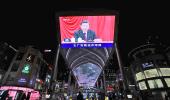Striking a tough posture at the much-awaited virtual summit with his United States counterpart Joe Biden on Tuesday, President Xi Jinping said that China will 'certainly defend' its sovereignty and security interests as he warned that whoever plays with fire over Taiwan's bid for independence will 'get burnt'.

In a lengthy speech touching a host of issues at the marathon summit, Xi, fresh from last week's ruling Communist Party of China Plenum meet endorsing an unprecedented third term for him from next year and perhaps for life, pointed Beijing's 'red lines' on several issues, including Taiwan, and said China's rise is an 'inevitable trend of history' and cannot be stopped.
Summing up the talks, Chinese Foreign Ministry spokesman Zhao Lijian told a media briefing in Beijing that the summit lasted for three and half hours exceeding the scheduled time with an interval in between.
"It is of great significance for China-US relations and international relations," Zhao said.
"The two sides had exchanges on a broad range of issues, including those of strategic, overarching and fundamental importance shaping the development of China-US relations, respective development agenda, domestic and foreign policies and regional and international issues of mutual interest," he said.
There was a consensus about rejecting a 'new Cold War' between the two leaders, he said.
President Biden also explicitly stated that the US does not seek a 'new Cold War', Zhao said.
The two Presidents agreed that their meeting is candid, constructive, substantive and productive, he said.
Earlier speaking to reporters in Washington, DC, Biden said it was both his and Xi's responsibility to ensure that the ties between the US and China do not veer into open conflict.
Xi said he was pleased to see his 'old friend' Biden, jarring with remarks hours earlier from White House press secretary Jen Psaki who told reporters that Biden did not view his Chinese counterpart in such terms, Hong Kong-based South China Morning Post reported.
Biden said he was looking forward to ensuring 'simple, straightforward competition' between the two countries.
"We need to establish some common-sense guardrails," he said, before emphasising collaboration, 'especially on vital global issues like climate change'.
"We have a responsibility to the world as well as to our people," Biden said.
The US president said his agenda for the meeting included human rights, economics and ensuring a free and fair Indo-Pacific.
The Taiwan question remained the prime focus of the two leaders at the summit.
On Taiwan, President Biden underscored that the United States remains committed to the 'one China' policy.
At the same time, he said the United States 'strongly opposes unilateral efforts to change the status quo or undermine peace and stability across the Taiwan Strait'.
On Taiwan, where China has pressed over 200 military jets into the estranged islands air defence zone ratcheting tensions, 68-year-old Xi ascribed the tensions to the repeated attempts by the Taiwan authorities to look for US support for their independence agenda as well as the intention of some Americans to use Taiwan to contain China.
"Such moves are extremely dangerous, just like playing with fire. Whoever plays with fire will get burnt. The one-China principle and the three China-US Joint Communiques are the political foundation of China-US relations," Xi told Biden.
Previous US administrations have all made clear commitments on this question.
"The true status quo of the Taiwan question and what lies at the heart of one-China are as follows: there is but one China in the world and Taiwan is part of China, and the Government of the People's Republic of China is the sole legal government representing China," he said.
"Achieving China's complete reunification is an aspiration shared by all sons and daughters of the Chinese nation. We have patience and will strive for the prospect of peaceful reunification with utmost sincerity and efforts.
"That said, should the separatist forces for Taiwan independence provoke us, force our hands or even cross the red line, we will be compelled to take resolute measures," he said.
Significantly, Xi in his talks with Biden referred to the just-concluded meeting of the CPC Plenum, which has reinforced his powers hailing him as 'helmsman', an honorific title reserved for party founder Mao Zedong.
The Plenum took stock of the major achievements and historical experience of the CPC in the past 100 years, Xi said.
"Over the past century, the CPC has kept to its founding aspiration and mission of striving for the happiness of the Chinese people and rejuvenation of the Chinese nation," he said.
"A lot has been accomplished in this direction, but that is far from enough. More needs to be done."
Xi said since he took over power in 2012 he had stated 'publicly that the Chinese people's aspiration for a better life is the goal to strive for'.
"Any attempt to stop this historical trend will be rejected by the Chinese people, and will by no means succeed," he said in an apparent reference to the US attempts to contain China's rise.
"As China's leader, serving the 1.4 billion Chinese people and working with them for a better life is a great challenge and a great responsibility. I shall put aside my own well-being and live up to people's expectations," he said.
Asking Biden to seize 'political leadership' to bring the bilateral ties back on track from the path of confrontation, Xi said managing differences and sensitive issues in a constructive way is the way out to prevent China-US relations from getting 'derailed or out of control'.
"It is only natural for the two countries to have differences. The key is to manage them constructively so that they don't magnify or exacerbate," he said.
But at the same time, he said, "China will certainly defend its sovereignty, security and development interests. It is important that the US properly handle the relevant issues with prudence."
"History is a fair judge. What a statesman does, be it right or wrong, be it an accomplishment or a failure, will all be recorded by history. It is hoped that President Biden will demonstrate political leadership and steer America's China policy back on the track of reason and pragmatism," he said.
He said the two countries need to respect each other's social systems and development paths, respect each other's core interests and major concerns, and respect each other's right to development.
"No conflict and no confrontation is a line that both sides must hold and the two countries should coexist peacefully by pursuing win-win cooperation," he said.
"With their interests deeply intertwined, China and the US stand to gain from cooperation and lose from confrontation. The world is big enough for the countries to develop individually and collectively. The right thing to do is to choose mutual benefit over a zero-sum game or the I-win-you-lose approach," Xi said.
China-US cooperation may not solve all problems, but few problems cannot be solved without China-US cooperation, he said.
Without referring to his multibillion-dollar pet project, the Belt and Road Initiative (BRI), or the rival Built Back Better World (B3W) floated by Biden, Xi said the global initiatives China has proposed are all open to the US.
"We hope the reverse is also true," he said.
He also hit out at Biden's initiative of uniting countries with democratic systems with plans to hold a summit of democracies next month to unite against China and authoritarian regimes.
"Democracy is not mass produced with a uniform model or configuration for countries around the world. Whether a country is democratic or not should be left to its own people to decide. Dismissing forms of democracy that are different from one's own is in itself undemocratic," Xi said.
In an apparent reference to US allegations of genocide against Uygurs in Xinjiang and Tibet as well as Hong Kong, he said China is ready to have dialogues on human rights on the basis of mutual respect, 'but we oppose using human rights to meddle in other countries' internal affairs'.
On climate change, he referred to the recent agreement between top polluters -- US and China -- at the COP26 Glasgow summit and said, "China will make the world's biggest cut in carbon emission intensity in the shortest time frame in history, a task that will require extraordinary efforts. China means what it says. It only commits to what it can deliver, and never makes a promise it cannot keep."
On COVID-19 and the debate over its origins in Wuhan where the virus first surfaced in 2019, Xi said that solidarity and cooperation is the most powerful weapon for the international community to defeat COVID-19.
"Response to any major disease must be based on science. Politicising diseases does no good but only harm. The pressing priority in the global COVID response is to address the vaccine deficits and close the vaccination gap," he said and suggested global vaccine cooperation.
He expressed his readiness to stay in touch with Biden through multiple means to set the direction and inject more momentum into bilateral relations.
The summit is the third engagement between Xi and Biden since February.
The two leaders had a lengthy phone call in September.










